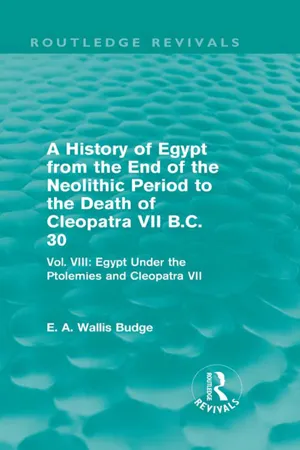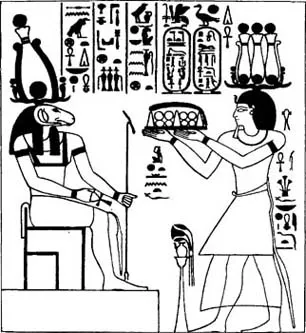![]()
EGYPT
UNDER THE
PTOLEMIES AND CLEOPATRA VII.
_____
CHAPTER I.
THE PTOLEMAÏC PERIOD.
8. King of the South and North, N
ETERUI -
MERUI -
[A]TUI -
ĀĀ -
SETEP -
EN - P
TAḤ -
USR -
KA - R
Ā - Ȧ
MEN -
SEKHEM -
ĀNKH,
1 son of the Sun, P
TUALMIS-
ĀNKH-
TCHETTA-P
TAḤ-
MERI.
PTOLEMY V., surnamed EPIPHANES, was the son of Ptolemy IV., by his sister and wife Arsinoë. He was born B.C. 210, and was made co-regent the following year; he ascended the throne on the death of his father in 205, and died by poison administered by one of his officials in 182. The hieroglyphic inscriptions of Ptolemy V. give us no information about the circumstances under which he came to the throne, and for these and other important matters concerning his reign we have to rely upon the works of classical writers. According to Polybius (xv. 25, Shuckburgh's Translation) three or four days after the death of Ptolemy Philopator Agathocles and Sosibius caused a platform to be erected, and summoned a meeting of the foot-guards and the household, as well as of the officers of the infantry and cavalry. Mounting the platform
they announced the deaths of the king and queen, and proclaimed the customary period of mourning for the people. They next placed a diadem upon the head of the child Ptolemy Epiphanes, and proclaimed him king, and read a forged will, in which the late king nominated Agathocles and Sosibius guardians of his son, and they exhorted the officers to be loyal to the boy. They next brought in two silver urns, one of which they declared contained the ashes of the king—which was true—and the other those of Arsinoë—which was not true.
When the people learned that Arsinoë was dead there was great excitement among them, and her miserable death “excited such a passion of pity and sorrow that the “city was filled with sighs, tears, and irrepressible lamen-
Ptolemy V. making offerings to Khnemu, lord of Qebḥet and Senmut.
“tation.” When Agathocles had deposited the urns in the royal mortuary, and had given orders for the laying aside of mourning, he gave the army two months' pay, and made them take the oath customary at the proclamation of a new king. He made Philammon, who had been the actual murderer of Arsinoë, governor of Cyrene, and he placed the boy-king under the care of his own mother, Oenanthe, and of the infamous Agathocleia; Pelops, the son of Pelops, he sent to Antiochus in Asia, to ask him to maintain friendly relations with Alexandria; and Ptolemy, the son of Sosibius, he sent to Philip of Macedon, to arrange a marriage between the royal families of the two countries. Ptolemy, the son of Agesarchus, he sent to Rome, and Scopas, the Aetolian, he sent to Greece to find recruits, his object being to send the soldiers already in the city to garrison duty in various parts of the country, and to employ the new recruits about the palace and in Alexandria. Agathocles then gave himself up to a life of debauchery, and “he devoted the “chief part of the day and night to drunkenness and “all the excesses which accompany drunkenness, sparing “neither matron nor bride, nor virgin, and doing all “this with the most offensive ostentation. The result “was a widespread outburst of discontent; and when “there appeared no prospect of reforming this state of “things, or of obtaining protection against the violence, “insolence, and debauchery of the court, which on the “contrary grew daily more outrageous, their old hatred “blazed up once more in the hearts of the common “people, and all began to recall the misfortunes which “the kingdom already owed to these very men. But “the absence of anyone fit to take the lead, and by “whose means they could vent their wrath upon “Agathocles and Agathocleia, kept them quiet. Their “one remaining hope rested upon Tlepolemus, and on “this they fixed their confidence.”
As long as Ptolemy IV. was alive Tlepolemus remained in retirement, but upon his death he again assumed the governorship of Pelusium. When he saw that Agathocles was monopolizing the supreme power, being afraid of the evil which might come upon him he began to collect both troops and money, and to shape his actions in such a way that the guardianship of the young king might devolve upon him. At the banquets which he gave frequently he purposely abused Agathocles and his sister, and when Agathocles learned these things he began to trump up charges of treason against him, and to declare that he was inviting Antiochus to come and seize the government. The object of Agathocles was to inflame the common people against Tlepolemus, but he failed utterly, for the populace had long fixed their hopes on Tlepolemus, and were only too delighted to see the quarrel growing hot between them. At length Agathocles summoned a meeting of the Macedonian guards, and taking his own sister and the young king, he went in before them and stood up to address them. “At first he feigned not to be able to say what he “wished for tears; but after again and again wiping “his eyes with his chlamys he at length mastered his “emotion, and taking the young king in his arms, “spoke as follows: ‘Take this boy, whom his father “on his death-bed placed in this lady's arms ’ (pointing “to his sister), ‘and confided to your loyalty, men “of Macedonia. That lady's affection has but little “influence in securing the child's safety; it is on you “that that safety now depends; his fortunes are in “your hands. It has long been evident to those who “had eyes to see, that Tlepolemus was aiming at “something higher than his natural rank; but now he “has named the day and hour on which he intends to “assume the crown. Do not let your belief of this “depend upon my words; refer to those who know the “real truth and have but just come from the very “scene of his treason.’”
With these words he brought forward Critolaus, who deposed that he had seen with his own eyes the altars being decked, and the victims being “got ready by the common soldiers for the ceremony “of a coronation.” When the Macedonian guards heard this they hooted Agathocles out of the building, which he left amid sounds of contempt and derision, hardly knowing how he did so. Agathocles then foolishly took Danae, the mother-in-law of Tlepolemus, from the temple of Demeter, and had her dragged unveiled through the city, and threw her into prison; but this act only enraged the people more. He also caused one of the bodyguard called Moeragenes, who was suspected of being in communication with Tlepolemus, to be arrested, and he would have been examined with torture but for some unforeseen matter which made it necessary for Nicostratus, the secretary of Agathocles, to leave the torture chamber, whereupon the torturers and the scourgers slipped out after him, and eventually Moeragenes himself escaped. Moeragenes fled half-naked into a tent of Macedonian guards, and he besought them with tears in his eyes to seize that moment and to wreak vengeance upon Agathocles without delay. The passions of the Macedonians having been roused, they went and discussed the matter with the men of their own and of other regiments, and in less than four hours every soldier had agreed that the moment had come for action.
Meanwhile an intercepted letter informed Agathocles that Tlepolemus would be at Alexandria shortly, and the spies said that he had already arrived; Agathocles, distracted at the news, went to his wine at the usual hour, and kept up the carouse, whilst his mother Oenanthe went in great distress to the temple of Demeter and Persephone, and begged these goddesses, with bowings of the knee and strange incantations, to help her. The ladies of the family of Polycrates tried to console her, but she abused them, and ordered her female attendants to drive them away, and to strike them with their staves if they refused to go. When night fell the whole city was filled with tumult, torches, and hurrying feet, and the open spaces round the palace, the stadium, and the street were filled with a motley crowd, as well as the area in front of the Dionysian Theatre. When Agathocles was informed of what was happening he roused himself, and accompanied by his family, went to the king, and taking him by the hand, he proceeded to the covered walk which ran between the Maeander garden and the Palaestra. By this time the crowd had collected in such numbers that every foot of ground was occupied, and every roof and doorstep filled with human beings. As day began to break the mob began to ca...




